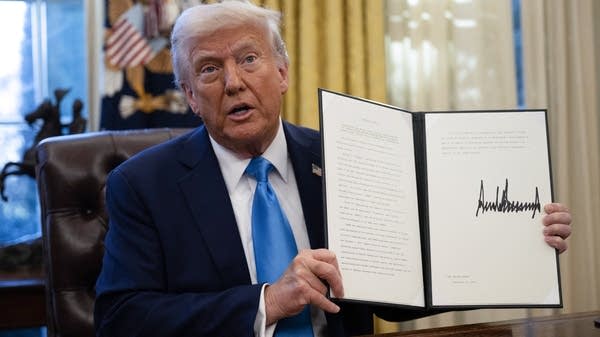A federal agency shut down by the Trump administration is fighting back
The U.S. African Development Foundation, known as USADF, had millions of dollars worth of grants and projects halted by the administration in March. The federal agency’s board is fighting back in court.

The U.S. African Development Foundation, or USADF, is a small, independent federal agency that — for the past 45 years — has promoted and supported economic development in Africa.
It’s done so by investing directly in farmers, small businesses and other entrepreneurs. Kim Ward, who worked at USADF for 27 years, has an example: After the Rwandan Genocide in 1994, the agency helped women who lost their husbands expand their basket-weaving co-op.
“That cooperative grew to 4,000 members and earned substantial income for people who are now saying, ‘Well — I have to rely on myself — how do I do that?’” he said.
The Trump administration effectively shut down USADF this spring, but the agency’s board is fighting back in court today to continue its work helping African farmers and other entrepreneurs scale up and become self-sufficient.
Ward, who was the agency’s managing director of programs, said that typically, the countries USADF is helping match the agencies’ grants 50/50. This means those nations are literally invested in their people’s outcomes.
“So they don’t need welfare, they don’t need food aid — they can produce the food themselves.”
At any given time, Ward said that the agency may have up to $1 million of the host country's money sitting in a USADF bank account. The agency also gets money from private donors, including the Citibank Foundation.
The Trump administration’s cost-cutting commission, known as DOGE, has fired staff and shut down field operations. On X last week, the commission said USADF has terminated $51 million worth of grants, including money for food production.
Now, Ward said that those African countries have an important question: “‘What did you do with the money we gave you that was earmarked for our groups — for the small villages and small enterprises in the country?’”
A Trump administration official didn’t answer this question when contacted by Marketplace. Instead, they said that roughly 70% of USADF programs were terminated to “ensure foreign aid puts America First.”
USADF’s fate is at the heart of the hearing in U.S. District Court in Washington. If the agency’s donors — including African countries — want their money back, they’ll have to file their own lawsuits, according to Erwin Chemerinsky, dean and professor at the University of California Berkeley School of Law.
“Something like a breach of contract suit or a suit to recover funds, but obviously the government can’t take money from individuals to be spent for a particular purpose and then not expend it for that purpose,” he said.
Former USADF managing director Kim Ward said his biggest concern is what happens to the people the agency was helping, since investments designed to prevent crises — including famine — have been terminated.







